
The giraffe is a large African hoofed mammal belonging to the genus Giraffa. It is the tallest living terrestrial animal and the largest ruminant on Earth. Traditionally, giraffes have been thought of as one species, Giraffa camelopardalis, with nine subspecies. Most recently, researchers proposed dividing them into four extant species due to new research into their mitochondrial and nuclear DNA, and individual species can be distinguished by their fur coat patterns. Seven other extinct species of Giraffa are known from the fossil record.

The Giraffidae are a family of ruminant artiodactyl mammals that share a recent common ancestor with deer and bovids. This family, once a diverse group spread throughout Eurasia and Africa, presently comprises only two extant genera, the giraffe and the okapi. Both are confined to sub-Saharan Africa: the giraffe to the open savannas, and the okapi to the dense rainforest of the Congo. The two genera look very different on first sight, but share a number of common features, including a long, dark-coloured tongue, lobed canine teeth, and horns covered in skin, called ossicones.
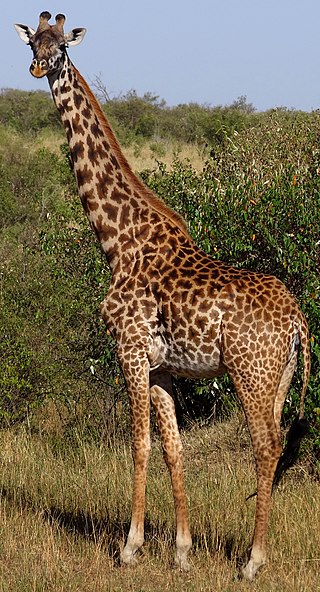
The Masai giraffe, also spelled Maasai giraffe, and sometimes called the Kilimanjaro giraffe, is a species or subspecies of giraffe. It is native to East Africa. The Masai giraffe can be found in central and southern Kenya and in Tanzania. It has distinctive jagged, irregular leaf-like blotches that extend from the hooves to its head. The Masai giraffe is currently the national animal of Tanzania.

The northern giraffe, also known as three-horned giraffe, is the type species of giraffe, G. camelopardalis, and is native to North Africa, although alternative taxonomic hypotheses have proposed the northern giraffe as a separate species.

Prosopocoilus giraffa, the giraffe stag beetle, is the world's largest stag beetle and is a member of the family Lucanidae within the order Coleoptera. They have very long, toothed and notched mandibles that protrude about half the size of their body. They tend to be aggressive and are fierce and powerful. Males fight each other using these strong and enlarged jaws to lift and throw rivals to win a mate. They can grow up to 119 millimetres in length. Several distinctive populations (subspecies) are found in moist forested region areas of Asia, ranging from India to Indonesia. Prosopocoilus giraffa keisukei can measure up to 12 centimeters. Prosopocoilus giraffa daisukei have the brightest elytra of all subspecies and Prosopocoilus giraffa giraffa is the smallest subspecies.
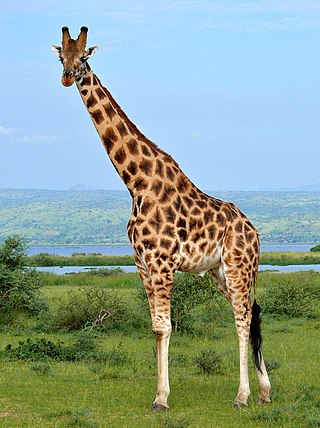
The Rothschild's giraffe is an ecotype of the Nubian giraffe. It is one of the most endangered distinct populations of giraffe, with 1,399 mature individuals estimated in the wild in 2018.
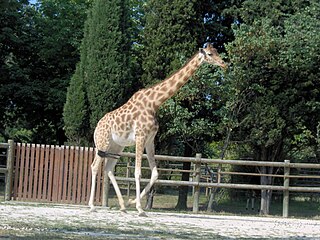
The Kordofan giraffe is a species or subspecies of giraffe found in northern Cameroon, southern Chad, the Central African Republic, and possibly western Sudan. They usually live in tree savannas, bush savannas and thorn savannas. Compared to most other subspecies, the Kordofan giraffe is relatively small at 3.8 to 4.7 meters, with more irregular spots on the inner legs. There are around 2,300 individuals living in the wild. In the wild, female Kordofan giraffes live in loose groups, whilst males live solitary. They have an average lifespan of around 35 years.
Bohlinia is an extinct genus of the artiodactyl family Giraffidae that lived during the Late Miocene in Eurasia and Africa. It was first named by the paleontologist Dr. W. Matthew in 1929, and contains two species, B. adoumi and B. attica. The species B. attica has been reclassified several times since its description being first named Camelopardalis attica and then reclassified as Giraffa attica.
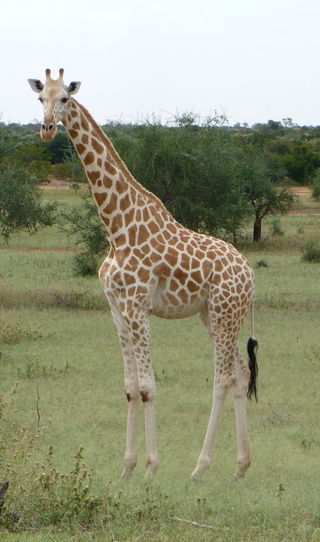
The West African giraffe, also known as the Niger giraffe, is a species or subspecies of the giraffe distinguished by its light colored spots. Its last self-sustaining herd is in southwest Niger, supported by a series of refuges in Dosso Region and the tourist center at Kouré, some 80km southeast of Niamey.

The South African giraffe or Cape giraffe is a species or subspecies of giraffe found in South Africa, Namibia, Botswana, Zimbabwe, Eswatini and Mozambique. It has rounded or blotched spots, some with star-like extensions on a light tan background, running down to the hooves.
Kouré is a rural community located 60 kilometres (37 mi) east of Niamey, the capital of Niger. The town lies on both sides of the road from Niamey to Dallol Bosso. As of 2012, it had a population of 46,249.
Giraffas is a Brazilian fast-food chain founded in August 1981 by two friends, Mauro Lacerda and Muniz Neto. Its first store is located in Lago Sul, in the Federal District. In 1991, the chain began franchising, and it has since expanded across Brazil. It has also opened in Paraguay and in Miami in the United States.

Thornicroft's giraffe, also known as the Rhodesian giraffe or Luangwa giraffe, is a subspecies of giraffe. It is sometimes considered a species in its own right or a subspecies of the Masai giraffe. It is geographically isolated, occurring only in Zambia’s South Luangwa Valley. An estimated 550 live in the wild, with no captive populations. Its lifespan is 22 years for males and 28 years for females. The ecotype was originally named after Harry Scott Thornicroft, a commissioner in what was then North-Eastern Rhodesia and later Northern Rhodesia.

Ruma National Park is the only terrestrial park in Kenya's Nyanza Province. Dubbed the "Last Retreat of the Roan Antelope", the park protects the only indigenous population of rare roan antelopes within Kenya. At present, the population is on the verge of extinction with individual populations numbering approximately 40. The park was established in 1966 as Lambwe Valley Game Reserve. It was later renamed “Ruma” after one of Kenya's most powerful wizard, the much feared Gor Mahia who lived around the park. The park is located in the vast Lambwe Valley.
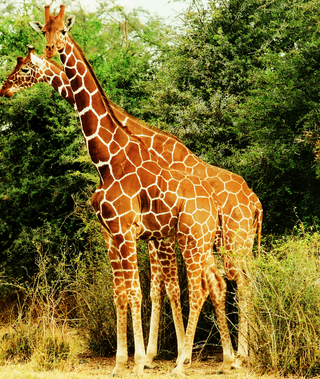
The reticulated giraffe is a species/subspecies of giraffe native to the Horn of Africa. It is differentiated from other types of giraffe by its coat, which consists of large, polygonal, block-like spots, which extend onto the lower legs, tail and face. These prominent liver-red spots also show much less white between them, when compared to other giraffe species. With up to 6 meters in height, the reticulated giraffe is the largest subspecies of giraffe and the tallest land animal in general. While the reticulated giraffe may yet still be found in parts of its historic range, such as areas of Somalia and Ethiopia, its population stronghold is primarily within Kenya. There are approximately 8,500 individuals living in the wild. In both captivity and the wild, as of 2024 there are 15,785 individuals across the world.
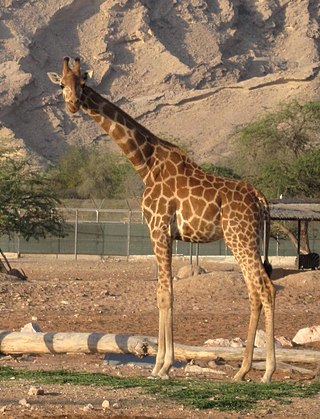
The Nubian giraffe, also known as Baringo giraffe or Ugandan giraffe, is the nominate subspecies or species of giraffe. It is found in Ethiopia, Kenya, Uganda, South Sudan and Sudan. It is currently extinct in the wild of the Democratic Republic of Congo, Egypt and Eritrea. The Nubian giraffe used to be widespread in northeast Africa. The subspecies was listed as Critically Endangered by the IUCN in 2018 for the first time due to a 95% decline in the past three decades.

The Angolan giraffe, also known as the Namibian giraffe or smokey giraffe, is a species or subspecies of giraffe that is found in northern Namibia, south-western Zambia, Botswana, western Zimbabwe and since mid-2023 again in Angola.

The southern giraffe, also known as two-horned giraffe, is a species of giraffe native to Southern Africa. However, the IUCN currently recognizes only one species of giraffe with nine subspecies.
Giraffa pygmaea is an extinct species of giraffe from Africa during the Pliocene, and died out during the Pleistocene about 0.781 million years ago.















